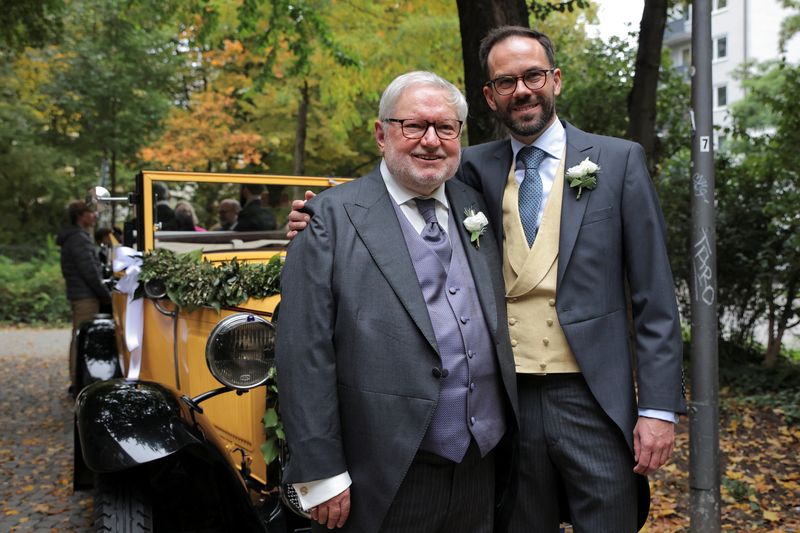By Louisa Off and Sarah Marsh
MUNICH (Reuters) - Anselm Bilgri, a former monk and prior at one of Germany's most famous monasteries, had to leave the Roman Catholic Church to wed his long-term male partner. Now he hopes their wedding within a breakaway church will normalise such unions.
Bilgri, 68, and his partner Markus Achter, 41, were wed in a Munich church on Saturday by a priest of the Old Catholic Church, which emerged in the Netherlands in the 19th century and lets priests marry and allows same-sex relationships.
"I immediately thought: now I have actually received all seven sacraments, from ordination to marriage," said Bilgri, chuckling after the ceremony. "And I would like it to become normal."
Bilgri, who was ordained in 1980 by Joseph Ratzinger, who became Pope Benedict, left the Roman Catholic Church in 2020 due to frustrations over its failure to modernise - the Vatican does not allow priests or same-sex couples to wed.
His was one of many departures from the Catholic Church in Germany amid anger over abuse scandals and a feeling among some that the institution is failing to keep up with the times.
That feeling intensified last year after the Vatican decided not to allow priests to bless same-sex unions. The ruling disappointed believers who had hoped Pope Francis would soften the hard line taken on the issue by John Paul II and his successor, Benedict XVI - and not just in Germany.
Flemish Roman Catholic bishops last month issued a document effectively allowing the blessing of same-sex unions in defiance of that ruling.
Bilgri ran the brewery at a Munich monastery before becoming prior, or deputy head, of the 900-year-old Andechs Abbey on Bavaria’s "Holy Mountain", in 1999 co-authoring the book "Cooking and Healing with Beer".
"Take this ring and wear it as a sign of love and faithfulness," Bilgri said as he slid a gold ring onto the little finger of Achter's right hand in a small church in Munich, both wearing matching black morning coats with white roses in their lapels.

The couple had already wed in a civil ceremony last year.
"I always think that if it becomes more and more self-evident, then at some point it will no longer be something special," said Achter. "That's the direction we want to go in, and maybe we have set a sign for that today."